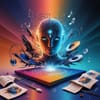Artificial intelligence is reshaping the landscape of creative industries, bringing fresh perspectives to art, music, and writing. This technological evolution is not just about automation; it’s about collaboration between human creativity and machine intelligence, opening up new possibilities for artists and creators alike.
In the realm of visual arts, AI tools are enabling artists to experiment like never before. With programs that can generate images based on simple prompts, creators can explore uncharted territories of design and aesthetics. These tools serve as collaborators, helping artists refine their ideas and expand their creative horizons. Rather than replacing the artist, AI enhances the creative process, allowing for a fusion of styles and techniques that were previously unimaginable.
Music is experiencing a similar revolution. AI algorithms can analyze countless songs to generate new compositions, pushing the boundaries of genres and sounds. Musicians are leveraging these technologies to find inspiration, create backing tracks, and even produce entire albums. This fusion of human artistry and machine learning is democratizing music creation, making it accessible to aspiring artists who may lack traditional training.
Writing, too, is being transformed by AI. From generating content to aiding in editing, AI tools are assisting writers in overcoming blocks and enhancing their storytelling. Whether it’s crafting engaging narratives or producing informative articles, AI is becoming an invaluable partner in the writing process. This collaboration not only boosts productivity but also sparks new ideas, enriching the creative landscape.
However, this integration of AI into creative fields does raise important questions about authorship and originality. As AI-generated works gain popularity, discussions about the nature of creativity and the role of the artist are more relevant than ever. The balance between human input and machine assistance will shape the future of these industries.
Ultimately, the impact of AI on creative industries is profound and multifaceted. By merging technology with human expression, we are witnessing a renaissance of creativity that promises to redefine how art, music, and literature are created and experienced. The journey is just beginning, and the possibilities are as limitless as the imagination itself.


